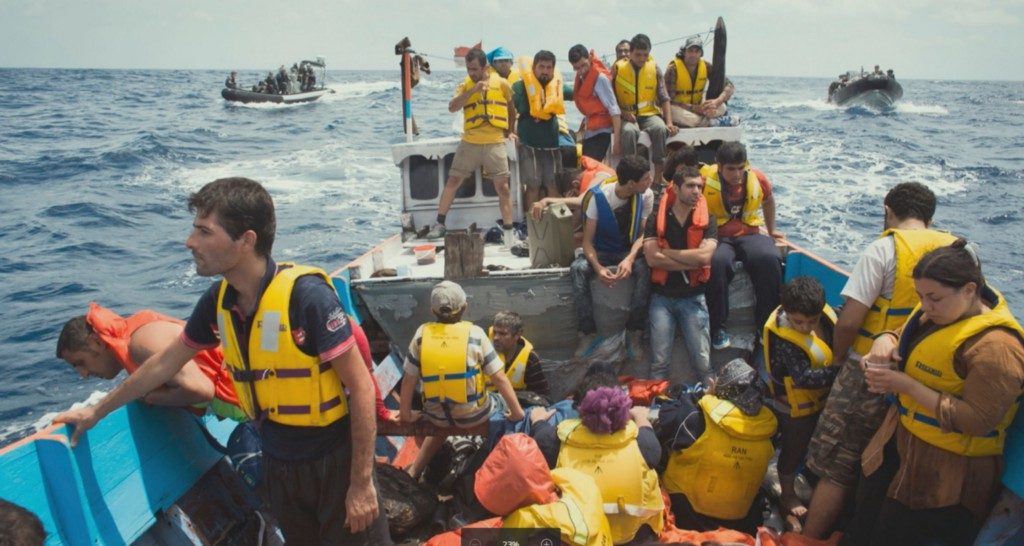Academy and Emmy Award winner Eva Orner is an Australian filmmaker based in Los Angeles. According to her bio, Orner wrote, directed, and produced the feature documentary “The Network,” set behind-the-scenes at the largest and most successful television network in Afghanistan. It has screened and won awards at festivals around the world including SXSW. Orner’s producing credits include the feature documentaries “Taxi To The Dark Side,” “Gonzo: The Life And Work Of Dr. Hunter S Thompson,” “The Human Behavior Experiments,” and “Herbie Hancock’s Possibilities.”
“Chasing Asylum” will premiere at the 2016 Hot Docs Film Festival on April 29.
W&H: Describe the film for us in your own words.
EO: “Chasing Asylum” exposes the real impact of Australia’s offshore detention policies and explores how “The Lucky Country” became a country where leaders choose detention over compassion and governments deprive the desperate of their basic human rights.
The film features never-before-seen footage from inside Australia’s offshore detention camps, revealing the personal impact of sending those in search of a safe home to languish in limbo.
Australia is a democratic nation with a proud history of welcoming refugees, yet we have become a country that indefinitely locks away men, women, and children in unsanitary conditions away from media scrutiny. Something has gone terribly wrong. “Chasing Asylum” seeks to explore what that something might be, and to show that it’s never right to destroy lives, even under the pretext of saving them.
“Chasing Asylum” examines the mental, physical, and fiscal consequences of Australia’s decision to lock away families in unsanitary conditions hidden from media scrutiny, destroying their lives under the guise of helping them.
W&H: What drew you to this story?
EO: I relocated to the United States in 2004 and never anticipated The Pacific Solution and offshore processing would still be policy in Australia in 2014 when I started the film.
Watching from afar I felt a growing sense of horror. As an Australian I was shocked that this was how our government had decided to treat desperate people. I watched with sadness as the hard line policies continued.
The government and the country must be held to account in a high profile, public way. Their harmful policies do not reflect the way a civilized democracy such as Australia should operate.
W&H: What do you want people to think about when they are leaving the theater?
EO: I want be people to be shocked, horrified and angry with Australia’s asylum seeker and refugee policies. And I want them to think about their own attitudes to refugees and asylum seekers and how their countries treat them.
W&H: What was the biggest challenge in making the film?
EO: So so so many. Access. Danger. Legal issues. No journalists, cameras or filmmakers are allowed into the detention camps on Manus Island and Nauru. Refugees and asylum seekers in detention cannot talk to media. In order to get eye witness accounts I had to travel to Iran, Afghanistan, and Lebanon to meet with and film refugees who had decided to return to their homelands after their treatment by Australia. Many returned to the persecution they fled. In a 20 year career this is by far the toughest film I have ever made.
W&H: How did you get your film funded? Share some insights into how you got the film made.
EO: I decided to raise the budget of the film privately as I felt an urgency to make it. I raised a little under 10 percent of the budget through crowd funding with Indiegogo, and the rest of the budget was financed independently. I was inspired and overwhelmed by the generosity and compassion of almost one thousand people who donated as part of the crowd fund and a large number of individuals and foundations who contributed. It made me believe that there are many Australians who believe our policies are wrong.
W&H: What’s the best and worst advice you’ve received?
EO: Best: I had been producing for over 15 years when my friend, filmmaker John Singleton repeatedly suggested, “You should direct.”
Worst: “You should direct.” When I became horribly ill in Afghanistan while directing my first film that resulted in 10 days in hospital, two bouts of pancreatitis, and two years of sickness.
W&H: What advice do you have for other female directors?
EO: Believe — in yourself, your ability, and your voice. And stand up and be heard. Be bold and fearless.
And support other women!
W&H: Name your favorite woman-directed film and why.
EO: Come on, we are so underrepresented — please let me name more than one!
In documentary I’m a big fan of Lucy Walker’s films. Loved “The Crash Reel” and “Wasteland.”
“Harlan County, USA” by Barbara Kopple is a fave.
In scripted I’m sticking with my antipodean roots and have to name Jocelyn Moorhouse’s “Proof” as an all-time favorite film and Jane Campion for everything.







